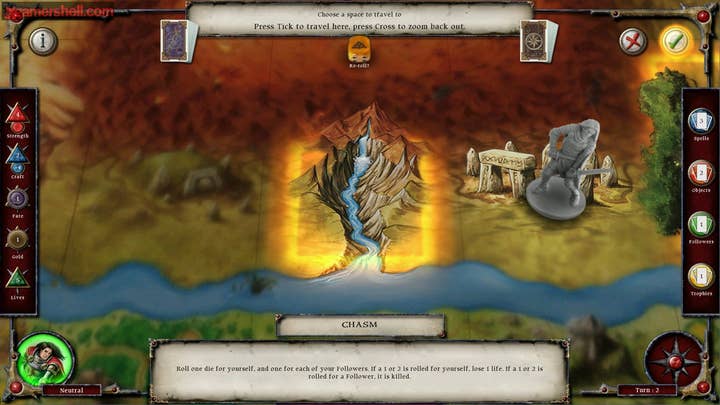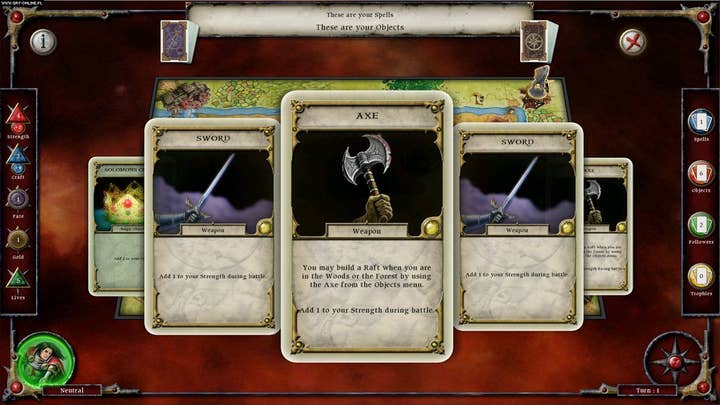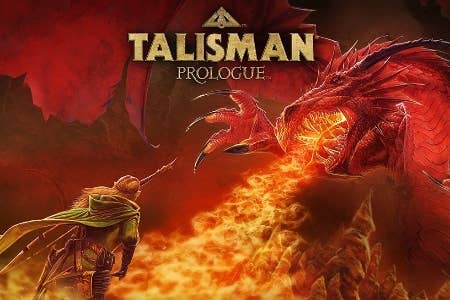The Crown of Command: Rebooting Talisman For a New Generation
Don Whiteford of Warrington's Nomad Games on how to rebuild a classic
If you're of roughly the same generation and habits as I am, chances are that the mention of Talisman will bring back happy memories. Games Workshop's classic board game was something of a gateway drug, complex enough to distinguish it from the Ludo and Monopoly of my early childhood, but without the seemingly Byzantine complexity of full-on pen and paper role-playing games.
Picked up for a month's pocket money at an annual London tabletop gaming event called Salute in the early '90s, Talisman lit a fuse in me which has, through a few twists and turns, lead me to where I am today.
So, a few years ago when I heard that Capcom were publishing a digital version of the game for Xbox LIVE and PSN, developed by Big Rooster, I was overjoyed. Sadly, it wasn't to be. Early on in development, Capcom announced that they were looking for a new team to take on the project, but quickly abandoned the idea.
"Rather recently we have finally stopped development completely," said the publisher's Christian Svensson. "After a misfire at the start, the details of which I won't get into, we evaluated several options for moving the project to new developers, but the costs of moving forward outweiged the potential revenue. I realize this will be disappointing for the fans of the game.
"The rights have reverted back to Games Workshop where I hope someone will pick them up and try again. I too still would like to play a Talisman video game."
Disappointing indeed, but luckily, a reward for the Talisman faithful was close at hand. Nomad Games, staffed by developers from THQ's defunct Warrington studio, has picked up the licence and is working on not one, but two versions of it for PC and mobile.
"As a digital studio, we'd been very interested in going in to the mobile area, so with the new studio we thought we'd make mobile a core part of what we were doing"
"I think it's fairly well publicised why Capcom stopped working on it," studio head Don Whiteford tells GamesIndustry International. "We picked up the licence because we'd just done, as THQ Digital UK, a game with Games Workshop called Warhammer 40K Kill Team. We were actually out at E3 when we heard the studio (THQ Warrington) was closing.
"We'd worked quite closely with Games Workshop for a number of years. The licensing manager, John Gillard, was out at E3 and asked us what we were going to do next. We said we were looking to start something up and he asked if we were interested in the licences that they had. As a digital studio, we'd been very interested in going in to the mobile area, so with the new studio we thought we'd make mobile a core part of what we were doing. One of the properties they had was Talisman, the board game. We'd seen that board games, particularly on touch devices, were doing quite well and being well received, so we thought: that's great.
"I must say, it's not been a trivial exercise, getting it into electronic form," Whiteford continues in a satisfied but tired tone. "There's such a complex ruleset behind it. From the graphical perspective it's not as challenging as a 3D game but from a game logic side there's a lot to get your head around. Of course, if it doesn't function exactly as the rules define it should, then we're going to lose people. So that's been the biggest challenge.

"The main issue is that a game of Talisman can go on for some time," he says in a slight understatement. "It's one of the reasons that Capcom cited as being a problem with developing it further. We realised that if we wanted to take it to the mobile space the game needed to work in bite-sized chunks, from short bursts all the way up to the full thing. People game differently in different environments, especially with the portable devices, sometimes you want a quick go for five or ten minutes or something, and sometimes you do want to pass the thing around and have maybe an hour or half an hour session with someone.
"So what we've done is, and our programmer Carl has designed this, is come up with this idea of a quest system. So the first release of Talisman is actually a game called Prologue, and effectively what we've done is create quests for each of the characters. Basically the game is focused at this stage on single player challenges to introduce players to all the characters and all the special abilities that the characters have. So that's Prologue, that's the starting point. It's like 50 quests with all the characters and you sort of work your way through. And you're given specific challenges, you're basically playing the board.
"We picked up the licence because we'd just done, as THQ Digital UK, a game with Games Workshop called Warhammer 40K Kill Team. We were actually out at E3 when we heard the studio was closing"
"It introduces all the cards, it introduces the way that the different characters work and gives you a really deep understanding of the game. At the same time we're working on the multiplayer version, and what we're going to do is look at how we execute the multiplayer version. Whether it will be instantly just a straightforward adaptation of the real board game, we're looking at different ways of doing it, different scenarios according to how players want to play it. So that's where we're at at the moment."
Talisman was, like so many of the borderline collaborative/competitive board games, always a tight balance of diplomacy, keeping fellow players onside until the tables had turned to your advantage, turning on them at the perfect moment to augment a triumph with the crushing humiliation of your peers. It sounds like Prologue is going to be purely single player focused, so is Whiteford comfident that it'll retain its charms?
"Asynchronous play is definitely an option," he explains. "Again, because we're doing the quests at the moment, you could design an asynchronous game where rather than just a turn you have to complete a set of objectives first before you pass it over to the next player. So it doesn't necessarily have to be one turn per go, it could be 'here's part of a quest', and that you actually leave something for the other player to pick up and go forward with, and that can vary depending on your outcome.
"So we can start to work with the potential of the game and that particular environment, the asynchronous play. Of course there'll be AI, and there'll be pass to play as well, so if you're in a room and you want to play a game, if you want to play a full game if you can do that, but if you wanted to play a quest based game which was shorter with a couple of you we're looking at things like co-operative questing where you actually help each other to do a certain type of objectives.
"I think that's always an interesting twist in a game like this, like Risk, is he going to help or is he going to kill me? That has to be there because that's really... that's the personal bit, at the end of the day."

Whilst Talisman is far from the top end of the complexity spectrum, following relatively simple guidlines for combat, magic and victory, it's certainly got its fair share of pieces and cards, alongside rules that take a few dry-runs to get the hang of.
"We have got quite an extensive tutorial in Talisman Prologue which does explain a lot of the little nitty gritty rules in there that some players may not understand. I think what we found as well is that there are some rules that, even when you implement them perfectly, can actually look like bugs, or it appears that something isn't working correctly even though it is.
"One of the main things we wanted to do was just make sure Talisman Prologue is easy for players who've never played Talisman to learn how to play it without having to read a 30 page rulebook"
"There's quite a good interactive tutorial in there to help players learn the game but I think one of the challenges we had as well was to take a game that has aspects where players can do things whenever they like, so there are spells that you can cast at any time, and other items that you can use at any time, and we had to think really carefully about how to allow the player to do those things without constantly prompting them in a very annoying way. 'Do you want to do it now? Do you want to do it now?'
"So we did spend a long time working on the UI and making the way the player interacts with the game very easy to pick up, easy to figure out what's going on. So one of the main things we wanted to do was just make sure Talisman Prologue is easy for players who've never played Talisman to learn how to play it without having to read a 30 page rulebook first, without playing against somebody who's going to beat them very easily, without them even having a chance. It's a very good introduction to the game, we feel.
"Having started with this, this is our first foray into it, it's definitely a path that we want to go down so we've got some other things lined up for the future. So it's an interesting place to be, obviously now on the Apple store there is, in the games, section, a board games section. There needs to be more!"
Talisman Prologue is out today for £5.99 from Nomad Games.









